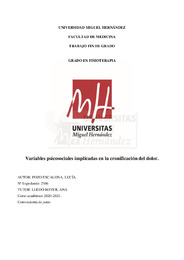Resumen :
Introducción: El dolor crónico es uno de los síntomas más frecuentes y que más preocupan e invalidan los
pacientes. El dolor es definido como una experiencia subjetiva en la que intervienen factores cognitivos,
sociales y biológicos. Por tanto, se debe ser tratado desde un modelo biopsicosocial y no únicamente
biomédico. En este contexto, la fisioterapia puede ofrecer una perspectiva de tratamiento en la que tenga en
cuenta todos estos factores para así optimizar resultados.
Objetivos: Identificar los factorespsicosociales que intervienen en el desarrollo y persistencia de los
problemasdel dolor crónico.
Material y métodos: Se realizó una búsqueda bibliográfica en la base de datos de Pubmed, Google academy
y Enfispo abarcando los últimos 20 años se obtuvieron un total de 21 artículos aplicando los criterios
utilizados.
Resultados: Se han estudiado principalmente factores cognitivos y sociales tales como el miedo al
movimiento, la ansiedad, actitudes y creencias sobre el dolor, sentimientos depresivos, catastrofismo, control
percibido y autoeficacia, traumas y apoyo social. Asimismo se ha comprobado la influencia de estas
variables psicosociales en la modulación del dolor.
Conclusiones: Los factores psicosociales pueden favorecer o empeorar la evolución de la patología y su
dolor. La evidencia respalda que la presencia de dichos factores psicosociales empeora el dolor pudiendo
llegar a perpetuarse en el tiempo más allá de lo esperado. La intervención del dolor crónico desde la
fisioterapia es eficaz si se trabaja desde un enfoque biopsicosocial para poder evitar la cronificación y ajustar
el tratamiento considerando también las características psicosociales del paciente.
Introduction: Chronic pain is one of the most frequent symptoms and one that most worries and invalidates
patients. Pain is defined as a subjective experience in which cognitive, social and biological factors
intervene. Therefore, it must be treated from a biopsychosocial model and not only biomedical. In this
context, physiotherapy can offer a treatment perspective that takes all these factors into account in order to
optimize results.
Objectives:
Identify the psychosocial factors involved in the development and persistence of chronic pain problems.
Material and methods: Cognitive and social factors such as fear of movement, anxiety, attitudes and beliefs
about pain, depressive feelings, catastrophizing, perceived control and self-efficacy, trauma and social
support have been studied mainly. Likewise, the influence of these psychosocial variables on pain
modulation has been verified
Results: Cognitive and social factors such as fear of movement, anxiety, attitudes and beliefs about pain,
depressive feelings, catastrophizing, perceived control and self-efficacy, trauma and social support have been
studied mainly. Likewise, the influence of these psychosocial variables on pain modulation has been verified.
Conclusions: Psychosocial factors can favor or worsen the evolution of the pathology and its pain. The
evidence supports that the presence of these psychosocial factors worsens the pain, which can be perpetuated
over time beyond what is expected. The intervention of chronic pain from physiotherapy is effective if it is
worked from a biopsychosocial approach in order to avoid chronification and adjust the treatment also
considering the psychosocial characteristics of the patient.
|
 La licencia se describe como: Atribución-NonComercial-NoDerivada 4.0 Internacional.
La licencia se describe como: Atribución-NonComercial-NoDerivada 4.0 Internacional.
.png)
